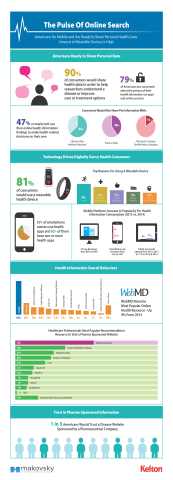NEW YORK--(BUSINESS WIRE)--Consumers are overwhelmingly ready to share personal health information to help researchers better understand a disease, particularly if they can do so anonymously. New findings from the fourth Makovsky Health/Kelton Survey reveal trends in how consumers access health information and manage personal health care – and it is driven increasingly by smartphones and new health technologies.
“The on-the-go health information movement is integral to the care patients seek in addressing their medical interests,” said Gil Bashe, executive vice president, practice director, Makovsky Health. “When health concerns strike, people want information almost immediately. Our industry continues to place importance on the mobile user experience, as consumers increasingly use smartphones and are more receptive to information from pharmaceutical-sponsored sources than in years past.”
Trust in Pharma-Sponsored Information
More than one in three Americans say they would trust a disease website sponsored by a pharmaceutical company (35%). At the same time, fewer Americans say they would never visit a pharmaceutical-sponsored website for more information about a disease or medication, with resistance dropping from 23% to 16% in the past year alone.
To help researchers understand a disease or improve care or treatment options, 90% of Americans are ready to share personal health information:
- 26% would share regardless of whether data were anonymous.
- 23% would share if they could control which data were anonymous.
- 40% would share if promised that all data would remain anonymous.
Showing a potential relationship between these two groups; consumers who would be willing to visit pharmaceutical-sponsored websites are more willing to share health information (91%), compared to those who say they would never visit a pharmaceutical-sponsored website (83%).
Technology Drives Digitally Savvy Health Consumers
When it comes to managing personal health, a majority of consumers would use a wearable health device (81%). However, industry data suggest that fewer than 10% are currently using one (Consumer Electronics Association). Data suggest tremendous market potential as “wearables” become more mainstream.
Mobile platforms, such as smartphones and tablets, continue to increase in popularity, nearly doubling in use compared to two years ago. Personal computers remain the main tool for health searches:
- The percentage of Americans using a PC to look for health information decreased from 83% in 2013 to 69% in 2014.
- At the same time, smartphone use has increased from 6% to 19% in the past year.
- Tablet use also is trending upward, from 4% in 2012 to 11% in 2013 and 2014.
The usage statistics show opportunities for pharmaceutical marketers to make their information more accessible to consumers and physicians on-the-go, particularly in light of data that point to the small number of pharmaceutical websites that are optimized for mobile (Manhattan Research).
"In this data, we see strong evidence that consumers are ready to take charge of their health," says Tom Bernthal, founder and CEO, Kelton Global. "Our work in consumer insights finds this proactive health-consciousness across the board. People are no longer satisfied with a passive role in their own healthcare."
Year-over-year findings in the Makovsky Health/Kelton Survey also show consistency among the largest and most noted sources in accessing health information. For the fourth straight year, WebMD remained the most popular online resource (62% in 2014, 53% in 2013), with Wikipedia (25% vs. 22%) and advocacy group websites like the American Heart Association and American Cancer Society (16% vs. 16%) rounding out the top three sources.
The strongest motivators to visit a pharmaceutical website are a healthcare provider recommendation (55%), a peer recommendation – climbing from the third position to second at 35% – and a news article mentioning a disease or medication (27%).
About the Survey
Fielded to 1,001 nationally representative Americans ages 18 and older by Kelton, the Makovsky Health survey investigated consumers’ behavior and preferences for engaging with online healthcare information. The margin of error is +/- 3.1 percentage points at the 95 percent confidence level.
About Makovsky Health
Makovsky Health is leading healthcare communications in its ongoing mission to improve the lives of patients served by biotech, pharmaceutical, wellness and device manufacturing companies. Honored as the 2013 Public Relations Agency of the Year, Makovsky campaigns have been recognized as the “Best in Healthcare,” “Best Education/Public Service Campaign” and “Best of the Best.” To learn more about the agency, please visit www.makovsky.com.
About Kelton
Kelton is a research, strategy and design consultancy that works with many of the world's largest and most recognizable brands to help them better understand and connect with consumers. Kelton provides highly customized qualitative, quantitative, innovation and design research for a wide variety of companies across multiple sectors. For more information, please see www.keltonglobal.com.




